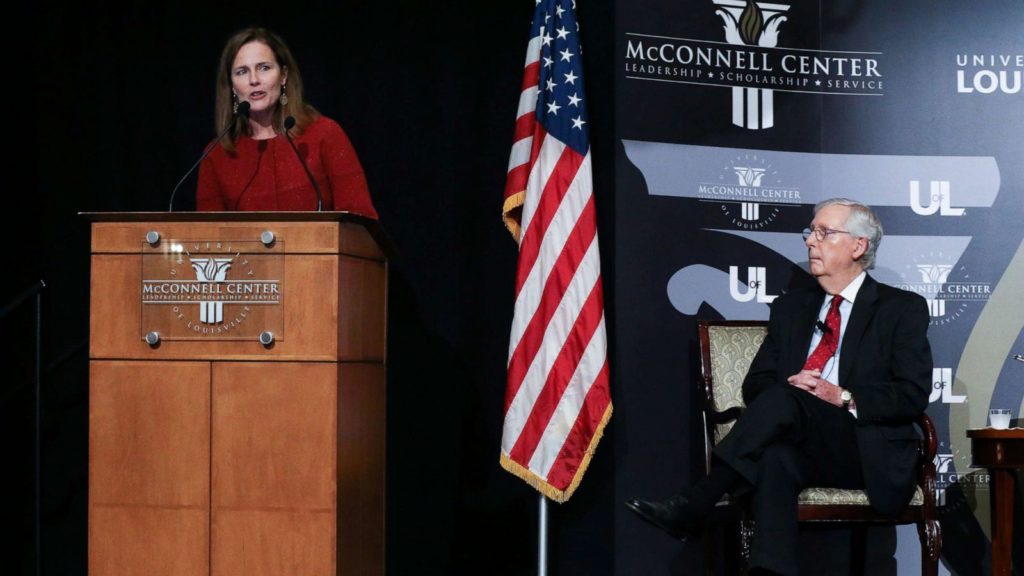Power without justification

“Don’t bother so much with the reasoning, it will only trip you up.” — William H. Rehnquist
Mark Joseph Stern points out that Amy Coney Barrett, arguably the most important Supreme Court justice confirmation in American history, is a lightweight who asked the public to judge the Court on its reasoning, while she mostly refuses to write anything and the Court re-writes huge swaths of American, sometimes with no reasoning at all:
Justices are politicians, whether they like it or not. They wield an immense amount of power, guaranteeing intense scrutiny of their words and actions. And because the court’s authority rests on public perceptions of its legitimacy, that scrutiny matters a great deal. When they decline to explain their votes, they create the impression that they’re exercising raw power instead of principled legal judgment.
That’s especially true of Barrett, whose eleventh-hour confirmation to replace the liberal Ruth Bader Ginsburg destabilized the entire judiciary. Trump, abetted by Sen. Mitch McConnell, rushed her onto the bench in the midst of an election to lock in GOP control of the courts. She refused to answer questions at her hearings, proffering opaque platitudes to avoid derailing her confirmation. This behavior foreshadowed her style of judging: provide as few answers as possible to preserve maximal latitude.
Since then, Barrett has done little to dispel the fumes of partisanship and illegitimacy that poisoned her appointment. Her attempts at public relations have backfired. She inked a lucrative book deal for her memoirs before she had produced a scintilla of a public thought. In September, the justice declared that she and her colleagues were not “a bunch of partisan hacks” while standing next to McConnell at a center named after him. (She limited press access to the event.) In April, she urged Americans to “read the opinions” before concluding that the court’s work was “purely results-driven.”
There’s just one problem with that instruction: During her tenure, the court has radically altered the law through the shadow docket without issuing any opinions. It did so once again just two days after Barrett’s read-the-opinion speech by a 5–4 vote. She wordlessly joined the majority.
Barrett’s performance at oral arguments, too, has been befuddling. She tends to ask very specific questions about some obscure aspect of the case, as if to flaunt her intricate knowledge of the record or her nuanced thinking. Then she signs onto an un-nuanced, hard-line opinion that completely ignores her putative concerns. Often, at arguments, she presents herself as a reasonable moderate earnestly grappling with the issues at hand; in opinions, she is just another automatic vote for a reactionary result.
Barrett has chosen a different tack: silence. This term, she has joined a number of important 6–3 and 5–4 decisions that shifted the law rightward without a sentence of explanation. The justice wrote nothing in Dobbs to tell us why she overruled Roe. She wrote nothing in Oklahoma v. Castro-Huerta, a brutal 5–4 assault on tribal sovereignty. Nothing in West Virginia v. EPA hobbling climate regulations; or Kennedy v. Bremerton allowing Christian prayer in public schools; or Carson v. Makinforcing public funding of religious education; or Vega v. Tekohundermining Miranda warnings; or the brutal habeas decisions that let states execute innocent people.
When Barrett does write a concurrence, it’s usually short and academic. Her opinion in the concealed carry case, for instance, ponders the precise historical period judges should look to when determining the original meaning of the Constitution. (As if the majority won’t start with its preferred conclusion and cherry-pick history to support it.) Her opinion in the Boston bomber case is a snoozer about federal appeals courts’ authority to impose procedural rules on district courts; it’s really just a summary of her own 2006 law review article. Her few concurrences pertaining to religious freedom were surprisingly open-ended and noncommittal for a justice who was expected to produce a robust free exercise jurisprudence.
A robot who votes the party line without needing to add much of anything to the US Reports — the ideal Republican justice, and especially the perfect justice to cement an illegitimate supermajority.


